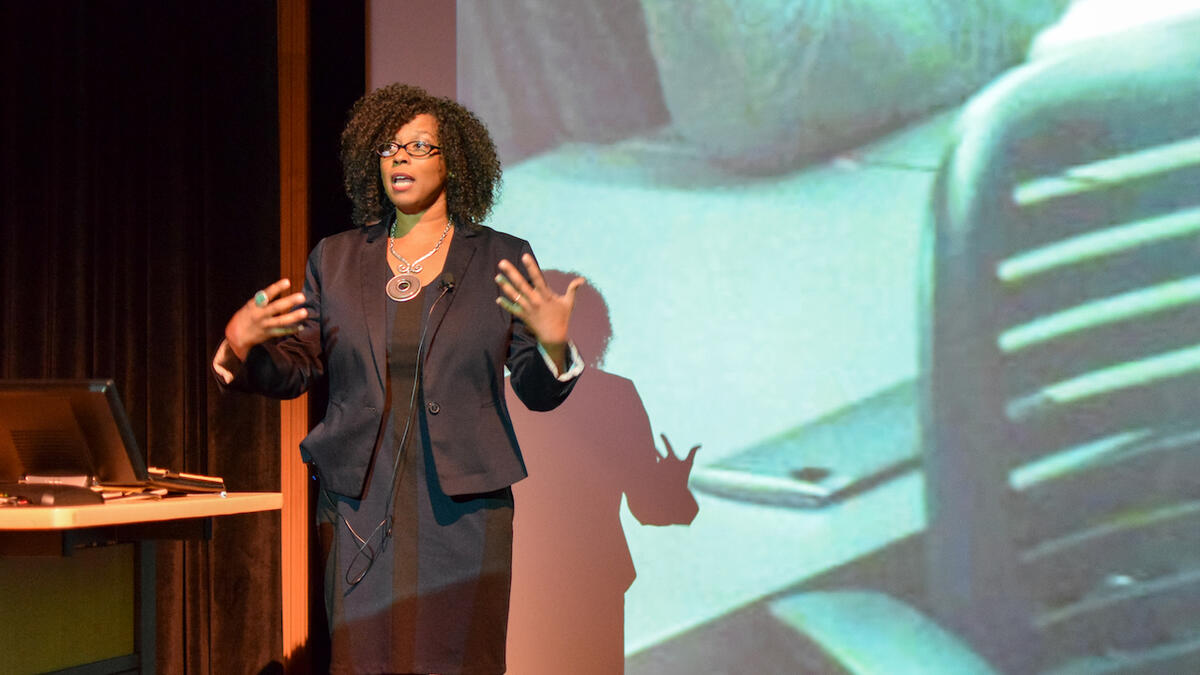Women of Color STEM Entrepreneurship Conference fosters collaborative thinking, collective change

Kimberly Scott, executive director of Center for Gender Equity in Science and Technology
Arizona State University's Center for Gender Equity in Science and Technology is hosting the Women of Color STEM Entrepreneurship Conference on March 23–25.
Titled "Wahine: Culturally Responsive Collective Catalyst," the conference is focused on bridging research and practice to build understanding, identify pathways and guide changes that broaden participation and inclusion of women and underrepresented populations in STEM fields.
Conference attendees will hear about challenges and solutions from multiple perspectives: leading researchers, practitioners in the field, funders catalyzing change, innovative educators, industry leaders and more. Attendees can also participate in one of the many interactive sessions designed for attendees to connect, apply knowledge and explore collaborative opportunities with each other, speakers and facilitators.
The conference is a hub for individuals working across the system to transform STEM for an inclusive future. A future where girls and women of color leading as techno-social change agents aren't the exceptions; they are the expectation.
Panels, presentations and interactive sessions
Keynote: "Leading Change in Higher Education."
System Mapping Results: "Leverage Points to Change the System" — Looking at what enables or inhibits equitable access and opportunity to quality, transformative and culturally responsive STEM pathways and experiences that are meaningful and responsive to girls of color.
High Impact Practices for Long Term Engagement of Girls of Color in STEM: Effective educators, student experiences and research perspectives.
Impacts of Gender and Diversity in Climate Science: Importance of perspectives in research and solution design.
Improving Workplace Experiences of WOC in Technology: Bias interruption, social-psychological intervention, and building belonging. Research findings and experiences in implementation.
Interactive Sessions: "Funding and Funders" (effective pitch practices; language use in funding RFPs); "High Impact Practices in Education" (out of the classroom educators, developing aspirations of girls of color towards CS); "Improving the Workplace" (policy interventions and leadership practices), "Undergraduate Experiences" (photo elicitation activity: studying persistence of Native women and two-spirit individuals in computing higher education), "Affecting Policy."
And more — more detailed descriptions of the sessions/workshop, as well as the speakers, will be released closer to the conference.
For the 2021 virtual conference, the Center for Gender Equity in Science and Technology is bringing its success from the past three conferences through powerful partnerships with Hawaii Pacific University, the Kapor Center, Women of Color in Computing Collaborative, Entrepreneurship and Innovation at ASU and the National Science Foundation.

Conference fees:
General attendance: $75 per day, $175 for all three days.
Kama’aina registration: $50 per day, $125 for all three days (for Hawaii residents only, state ID is required).
Scholarship opportunities: Scholarships opportunities are available to teachers, educators, students, allies and industry individuals who need registration support to attend this year's conference. There are a limited number of scholarships that the Center for Gender Equity in Science and Technology can provide, but email cgest@asu.edu with your name, email and role (teacher, non-profit, student, etc.) to be put on the list and they will let you know when that opportunity will be available for you.
View more information about the conference on the CGEST website. For questions, email cgest@asu.edu.
More Science and technology

ASU technical innovation enables more reliable and less expensive electricity
Growing demand for electricity is pushing the energy sector to innovate faster and deploy more resources to keep the lights on…

What do a spacecraft, a skeleton and an asteroid have in common? This ASU professor
NASA’s Lucy spacecraft will probe an asteroid as it flys by it on Sunday — one with a connection to the mission name.The asteroid…

Hack like you 'meme' it
What do pepperoni pizza, cat memes and an online dojo have in common?It turns out, these are all essential elements of a great…

